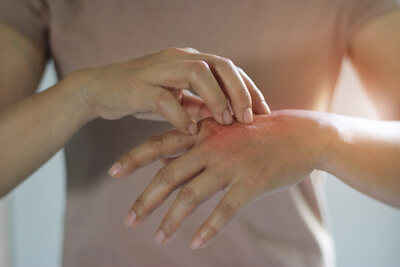WHAT IS ECZEMA AND WHY DO I HAVE IT?
Are you tired of breaking out in itchy rashes that make you scratch compulsively, even in your sleep? Have you taken every anti-histamine and immune suppressant there is and it just doesn’t seem to make a dent? Have you tried nearly every cream there is without much relief?
These hot rashy outbreaks are our skins way of saying that something is definitely not right with our immune system, and there are a number of reasons why this might be happening.
- Allergic response – Eczema sufferers are more predisposed to bacterial, fungal and viral skin infections. They may suffer from other conditions such as hay fever and/or asthma, due to a sensitivity to histamine. Eczema is also frequently the result of a contact environmental sensitivity, such as chemicals, metals, clothing or even plants. Unfortunately, the culprit can sometimes be difficult to find and testing may be necessary to isolate it.
- Stress – Stress can be a potent activator for our immune systems inflammatory mediators acting as a trigger for flare-ups. This inflammatory response then burns through precious nutrients that would otherwise be available for skin manufacture and healing processes.
- Genetic susceptibility – It’s not unusual for eczema or related allergies to be observed in relatives. Recent studies have demonstrated that variations in the KIF3A gene are responsible for the loss of skin barrier integrity, allowing for increased water loss from the skin and resulting in eczema. Genetics may predispose you to eczema but it does need the right environment for full expression. This is why some people who have the KIF3A gene may not necessarily suffer from eczema.
- High temperatures – sweating and hot showers can cause loss of moisture from already dry skin and weakened skin.
- Synthetic clothing – generally increases sweating so best to opt for more natural fibres such as cotton.
- Nutrient deficiencies – This can leave you lacking in vital resources necessary for skin cellular health. While the solution may seem to be as simple as a healthier diet, the reality is that nutrient deficiencies can be the result of a multitude of reasons and not just a poor diet.
- Low detoxification – your liver and lymphatic system are responsible for detoxifying your system. If that toxic burden is too great for them to cope with, or they just aren’t performing as they should for one reason or another, toxins can re-circulate and cause or amplify inflammation.
- Poor gut health – We’ve all heard a lot about how gut health and beneficial bacteria can affect our health, and with good reason. Things like a poor gut lining and lack of beneficial gut bacteria can reduce nutrient absorption and cause inflammation, meaning we’re left with no resources for skin health and an angry immune system.

Treatments like Antihistamines, Corticosteroids, Antibiotics and Calcineurin inhibitors are often used to suppress the immune response and control swelling, redness and itching. Unfortunately, some of these can actually have some undesirable side effects, such as damaging your stomachs microbiome, increasing your susceptibility to infections, increasing your risk of developing diabetes and reducing your bone mass. Suppressing the immune system to “quieten” eczema may seem a reasonable short term option given the maddening unrelenting suffering eczema causes, but wouldn’t a more long term solution focusing on the cause rather than the symptoms that were less chemical-based be a better option?
A more robust treatment strategy for eczema should focus on providing your skin with the nutrients required to nurture and protect itself. Working with nutrition and herbs to defuse an angry out of control immune system is always a better option than simply suppressing it with medication, would you not agree? So what are your options? Read on…..
DIET
A diet high in anti-inflammatory, detoxifying foods ensures we have a healthy microbiome, good detoxification, reduced inflammatory reactions and lots of nutrients for skin health.
- Consume lots of whole foods such as leafy greens, legumes, nuts, seeds and oily fish. These foods are high in anti-inflammatories, will assist in detoxification and supply a wide variety of nutrients to feed your skin and calm your immune system.
- Protein is essential for skin cell manufacture so make sure you include a good clean source in every meal.
- Reduce consumption of foods that may stress or inflame your system such as refined carbohydrates like non-wholegrain flours and all sugars, saturated fats, artificial flavourings and alcohol. These foods are poor in nutritional content, can damage your microbiome and add to the toxins that your liver needs to clear.
- Avoid foods that may inflame your system and trigger an attack. If you have eczema, hay fever or asthma, it’s very likely that you may be sensitive to certain foods, such as those high in histamine.
PERSONAL CARE ITEMS
Reduce the number of items you spay, rub or wash with. If it has an aroma it most likely contains chemicals that will dry and possibly aggravate your skin. Trial natural unscented soaps and moisturisers. Read the label as less is more!
SUPPLEMENTS
- Essential Fatty Acids
Essential fatty acids like those found in fish oil are vital for the make-up of our cellular membranes, when they are lacking in our diet, we can find our skin looking dry, inflamed and lifeless. Incorporating good quality essential fatty acids are necessary for maintaining the integrity of your skin barrier and reducing water loss. - Zinc
Zinc is a mineral that is required by your immune system to combat inflammation, bacteria and viruses. Zinc is needed for your protein and DNA and is necessary for all cellular manufacture. It is one of the most vital nutrients for skin cell manufacture and healing. - Vitamin B
B vitamins are essential to so many physiological functions and your skin is no exception, Taking B vitamins orally and applying them topically can help to relieve itching, restore skin hydration and assist in healing by producing new skin cells. B vitamins also normalise the pH of the surface of the skin and help increase blood flow assisting the delivery of nutrients to the skin.
- Vitamin A
Oral supplementation and topical application of Vitamin A can assist in the manufacture and maintenance of skin cell membrane. It regulates blood flow, ensuring a healthy supply of oxygen and nutrients to promote repair and protection.
HERBAL MEDICINE
- Calendula – As an antibacterial, anti-fungal, anti-inflammatory and wound healing moisturiser, this lovely little simple flower is every eczema sufferer’s best friend.
- Aloe Vera – Apart from acting as a wonderful moisturiser that assists in wound healing, Aloe Vera also has some pretty impressive gifts as an antibacterial and anti-fungal as well. Apply in a cream or just cut a fresh leaf open and apply the juice.
- Echinacea – You probably know this herb from its lovely purple flowers and its use in respiratory infections, but Echinacea can be used for so much more than just clearing those pesky chest infections. Echinacea is a powerful immune balancer, anti-inflammatory, anti-microbial, anti-fungal and wound healer. Applying it topically in a cream can soothe and heal your skin while taking it orally can assist in calming an angry immune system.
While over the counter medications may seem like a great quick fix, their effectiveness rarely lasts and ultimately they can have some pretty nasty side effects.
There is much that can be done naturally to manage eczema and reduce the frequency and severity of flare-ups. The solution is to support your beautiful skin from the inside out, restoring a healthy immune response and a glowing complexion.


